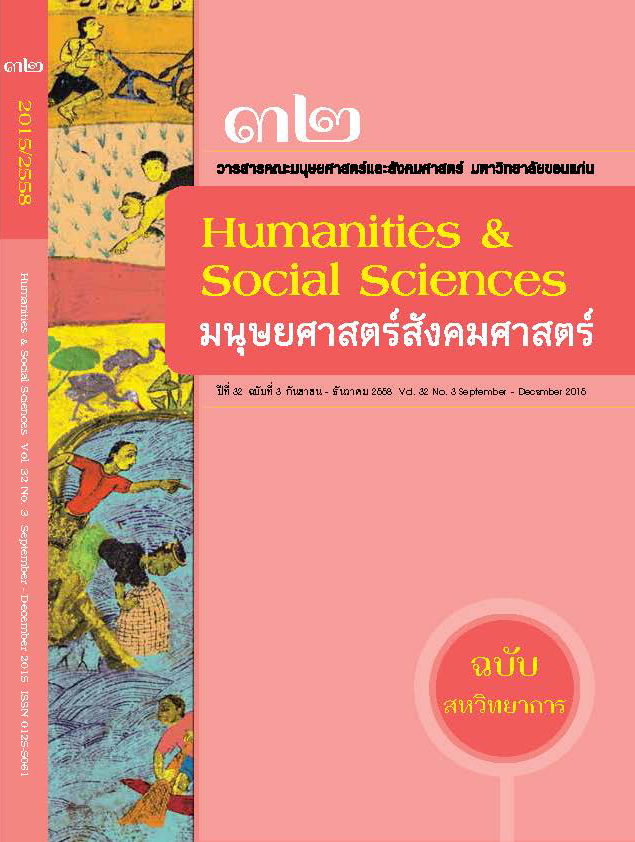การศึกษาวิเคราะห์รูปแบบการพัฒนาคุณภาพชีวิตเชิงพุทธบูรณาการ
Keywords:
รูปแบบการพัฒนา, คุณภาพชีวิต, พุทธบูรณาการAbstract
การศึกษาวิเคราะห์รูปแบบการพัฒนาคุณภาพชีวิตเชิงพุทธบูรณาการ
An Analytical Study of Model in the Quality of Life Development
According to Buddhist Intergration
บทคัดย่อ
งานวิจัยนี้มีวัตถุประสงค์ 1) เพื่อศึกษาแนวคิดทฤษฎีการพัฒนาคุณภาพชีวิตของศาสตร์สมัยใหม่และพระพุทธศาสนา 2) เพื่อศึกษารูปแบบการพัฒนาคุณภาพชีวิตตามหลักพระพุทธศาสนาของชุมชนบ้าน
ดงบัง ตำบลคอนฉิม อำเภอแวงใหญ่ จังหวัดขอนแก่น และ 3) เพื่อวิเคราะห์รูปแบบการพัฒนาคุณภาพชีวิต
เชิงพุทธบูรณาการ การวิจัยนี้เป็นการวิจัยเชิงคุณภาพ โดยศึกษาจากพระไตรปิฎก คัมภีร์พระพุทธศาสนา
อื่น ๆ เอกสารวิชาการทางพระพุทธศาสนา งานวิจัยที่เกี่ยวข้องและศึกษาจากภาคสนาม ด้วยการสังเกต
และสัมภาษณ์ โดยใช้วิธีวิเคราะห์เชิงพรรณนา แล้วนำมาเขียนเป็นรายงานการวิจัย
ผลวิจัยพบว่า การพัฒนาคุณภาพชีวิตในมิติของศาสตร์สมัยใหม่ เน้นการพัฒนาคุณภาพชีวิตที่มุ่งการตอบสนองภายนอกเป็นส่วนใหญ่ เช่น การมีปัจจัย 4 บริโภคอย่างเพียงพอ การมีระบบเศรษฐกิจ การศึกษา การเมือง ความปลอดภัยในการดำเนินชีวิตที่มั่นคง และการมีสัมพันธภาพที่ดีระหว่างบุคคล แต่การพัฒนาคุณภาพชีวิตทางพระพุทธศาสนา จะให้ความสำคัญทั้งกายและจิต การพัฒนาคุณภาพชีวิตที่แท้จริงของมนุษย์ต้องทำให้ครบทั้งสองด้านไปพร้อมๆ กัน
รูปแบบการพัฒนาคุณภาพชีวิตตามหลักพระพุทธศาสนาของชุมชนบ้านดงบัง ตำบลคอนฉิม อำเภอแวงใหญ่ จังหวัดขอนแก่น ประกอบด้วย 3 รูปแบบ คือ 1) รูปแบบของคน มีหลักการสำคัญคือ การกล้าปรับเปลี่ยนแนวความคิดจากแบบเดิมมาสู่แนวคิดใหม่ โดยการศึกษาหาความรู้จากบุคคลตัวอย่างที่ประสบความสำเร็จ โดยการแนะนำของท่านผู้รู้หรือกัลยาณมิตร 2) รูปแบบการทำงาน เป็นไปตามหลักปรัชญาเศรษฐกิจพอเพียงและรูปแบบเกษตรทฤษฎีใหม่ที่เน้นทำการเกษตรแบบพออยู่พอกินและเน้นให้การพึ่งพาช่วยเหลือซึ่งกันและกันในชุมชน เพราะรากฐานเดิมของเกษตรกรนั้นประกอบอาชีพเกษตรกรรมเป็นหลัก และ 3) รูปแบบการใช้คุณธรรมในการดำเนินชีวิต เพราะแม้เกษตรกรจะมีการไปศึกษาหาความรู้แล้วนำหลักการเกษตรมาทำจนประสบความสำเร็จเพียงใด แต่หากขาดหลักคุณธรรมเสียอย่างเดียว ชีวิตย่อมไม่ประสบความสุขได้ เพราะหลักคุณธรรมนั้นเป็นหลักการที่สำคัญที่สุดในการพัฒนาคุณภาพชีวิตของมนุษย์
รูปแบบการพัฒนาคุณภาพชีวิตเชิงพุทธบูรณาการโดยใช้หลักไตรสิกขา คือ ศีล สมาธิและปัญญา พบว่า การพัฒนาคุณภาพชีวิตของชาวบ้านดงบังตั้งอยู่บนพื้นฐานของไตรสิกขา โดยการดำรงชีวิตตามกฎเกณฑ์ของสังคม การทำหน้าที่ของตนให้เป็นปกติตามสถานะและบทบาทนับเป็นการใช้หลักการของศีล ความตั้งใจมั่นในการประกอบสัมมาอาชีพจนประสบความสำเร็จ การมีสุขภาพจิตที่ดี การมีสมรรถภาพทางจิตที่เข้มแข็งมีความพากเพียรพยายามในการประกอบหน้าที่การงาน นับเป็นการใช้หลักการของสมาธิ และการมีความรู้ทั้งในการประกอบอาชีพ การพิจารณาแยกแยะสิ่งที่ควรไม่ควร การสามารถปรับเปลี่ยนแนวความคิดจากการดำรงชีวิตในรูปแบบเดิมมาใช้แนวความคิดใหม่ การมีเหตุมีผลในการดำรงชีวิตนับเป็นการใช้หลักการของปัญญา
คำสำคัญ : รูปแบบการพัฒนา, คุณภาพชีวิต, พุทธบูรณาการ
Abstract
This research aimed to 1) examine the theoretical concepts of life-quality development according to modern science and principles of Buddhism 2) investigate the patterns of life-quality development according to the principles of Buddhism in Baan Dong Bung Community, Kornchim Subdistrict, Waengyai District, Khon Kaen Province and 3) to analyze the patterns of Buddhist integral way of life-quality development. It is the qualitative research whose data was collected from Tripitaka (Buddhist scripture), other Buddhist Books, Buddhist academic paper, related researches and a field study. The data was collected using observation and interview. Then, it was analyzed and the results were written in the form of a descriptive research report.
The results of the study showed the following. Life-quality development according to modern science focused mainly on the external responses such as having enough to meet basic human needs, systematic economy, education, politics, life security and good interpersonal relationships. However, life-quality development according to the principles of Buddhism gave priority to both body and mind. To obtain the actual life quality, both body and mind had to be developed simultaneously.
There were three patterns of life-quality development according to the principles of Buddhism in Baan Dong Bung Community, Kornchim Subdistrict, Waengyai District, Khon Kaen Province. 1) Human being pattern: The major principle was being bold to transform the old ideas to new ones by studying from other successful models with suggestions of knowledgeable people or true friends. 2) Working pattern: The patterns conformed to the principles of the Sufficiency Economy Philosophy and the modern agricultural development theory which emphasized on sustainable agriculture and a self-reliant community because agriculture was the main job of the residents. 3) Pattern of moral principles in livelihood: Although the agriculturists had studied and applied the agricultural principles and succeeded in their lives, they still needed moral principles to achieve happiness in their lives because the moral principles were the most important factor in developing life quality.
The pattern of life-quality development according to Buddhism integration, Three Studies: morality, concentration, and wisdom: The life-quality development of Dong Bung residents is based on the foundation of the three studies. They followed the social rules and performed their regular duties according to their status and roles. These activities were under the morality of the right livelihood to be successful in life. Possessing good mental health, a strong mind, and working hard were considered as practicing concentration. Having knowledge about work, being able to differentiate between good and bad, possessing the ability to change ideas, and having purpose in livelihood were considered as following the wisdom principle.
Keywords: development pattern, life quality, Buddhism Integration



